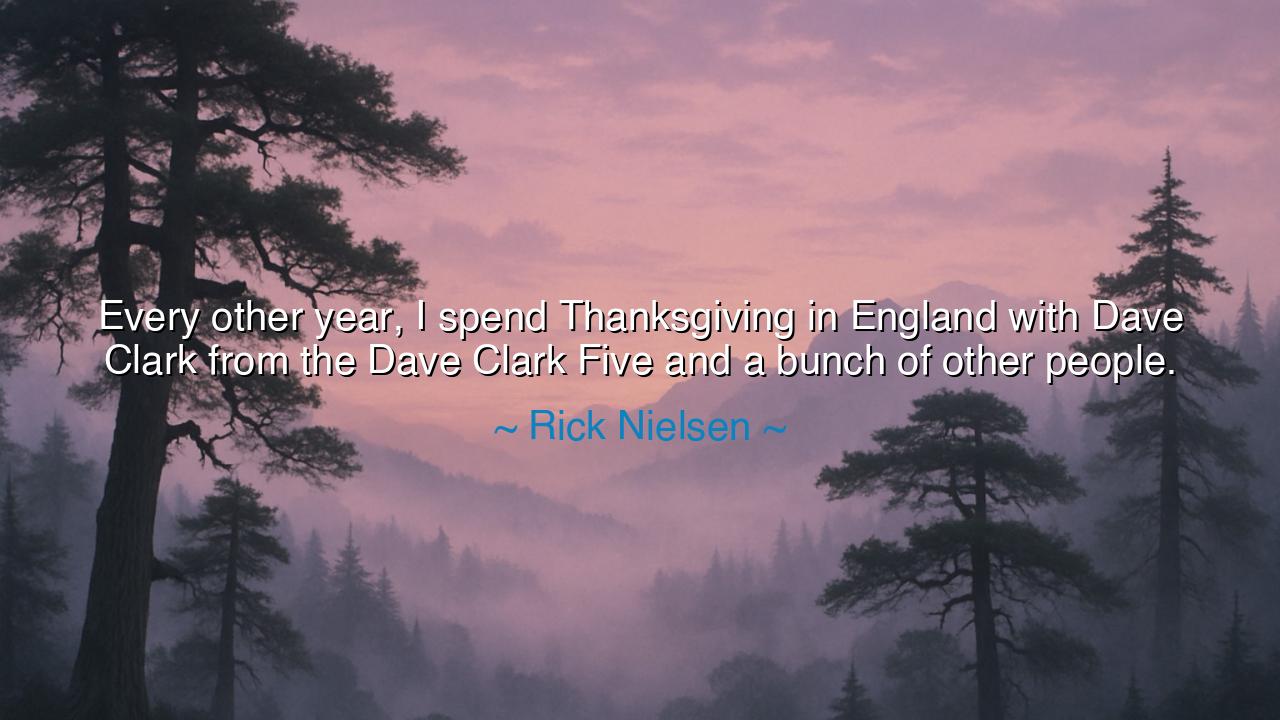
Every other year, I spend Thanksgiving in England with Dave
Every other year, I spend Thanksgiving in England with Dave Clark from the Dave Clark Five and a bunch of other people.






Rick Nielsen, in his words—“Every other year, I spend Thanksgiving in England with Dave Clark from the Dave Clark Five and a bunch of other people”—reveals a truth about tradition, companionship, and the power of keeping bonds alive across borders. Though spoken in a casual tone, the message carries depth: that the meaning of Thanksgiving is not limited by geography, nor bound to one’s homeland. Rather, it is found wherever fellowship, memory, and gratitude are honored among kindred spirits.
The origin of this quote lies in Nielsen’s own life as a musician, traveling the world, living between stages and studios, often far from home. In such a life, the usual rhythms of family gatherings can be disrupted. Yet he shows us that traditions need not vanish; they can be reborn in new lands, sustained by the company of friends who become family. In this way, Nielsen demonstrates that Thanksgiving is less about the land beneath one’s feet and more about the people gathered at one’s side.
History gives us countless examples of this principle. During World War I, American soldiers stationed in Europe celebrated Thanksgiving with whatever provisions they could gather. Far from home, they shared canned goods and makeshift meals, transforming barren fields into spaces of gratitude. Their companions were not always kin, but comrades in arms. In those moments, the spirit of Thanksgiving traveled beyond its American roots, becoming universal—an act of pausing to honor life, even in hardship. Nielsen’s gatherings in England echo this same resilience of tradition across distance.
There is also wisdom in his mention of Dave Clark, a fellow musician. To celebrate such a holiday in the company of those who share one’s path is a reminder that friendship, too, can be a form of family. In every age, wanderers, scholars, soldiers, and artists have built chosen families abroad, with whom they mark the festivals of their homelands. The Apostle Paul, separated from his kin, often wrote of the brothers and sisters he found in foreign cities, who became his companions in worship and in joy. So too does Nielsen remind us that belonging can be forged, not only inherited.
What Nielsen teaches, then, is that tradition is portable. It can be carried like a flame, passed from hearth to hearth, even in foreign lands. You need not abandon the rituals of gratitude when you are far from your birthplace; rather, you can kindle them anew, binding strangers and friends together in shared celebration. What matters is not the exact menu or the setting, but the spirit of gratitude that fills the air.
For the listener, the lesson is clear: wherever life may take you, do not forsake the practice of gratitude. If you cannot sit at the table of your ancestors, build a new table with those beside you. Invite friends, neighbors, even strangers, and make of them your family for the day. In this way, you honor both the tradition you carry and the people with whom you now walk the path of life.
Practical wisdom follows: when you are abroad, seek not to mourn the absence of home, but to recreate its spirit. Share a meal, however modest. Speak words of thanks. Keep alive the rituals that bind you to your roots, even as you graft them into new soil. For in this practice lies not only joy for the moment, but also a legacy—your children, your companions, and even those strangers who once sat at your table will remember that you carried tradition with you.
Thus, Rick Nielsen’s words, light in tone, carry an ancient truth: that gratitude transcends borders, and that holidays are not bound to a place, but to the human heart. Let this teaching endure—wherever you are, honor the feast of thankfulness, for in doing so, you carry forward the eternal rhythm of remembrance, fellowship, and love.






AAdministratorAdministrator
Welcome, honored guests. Please leave a comment, we will respond soon